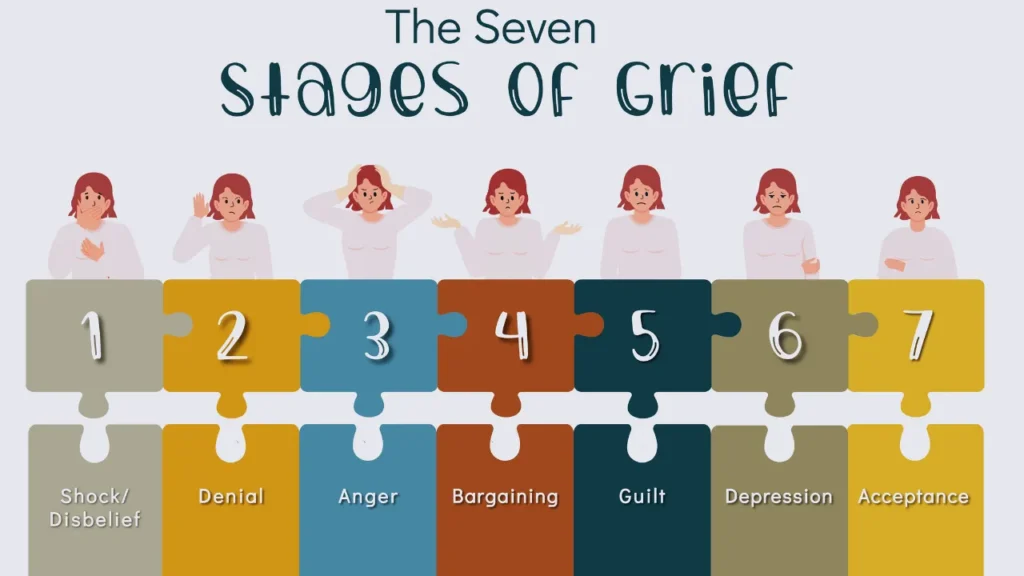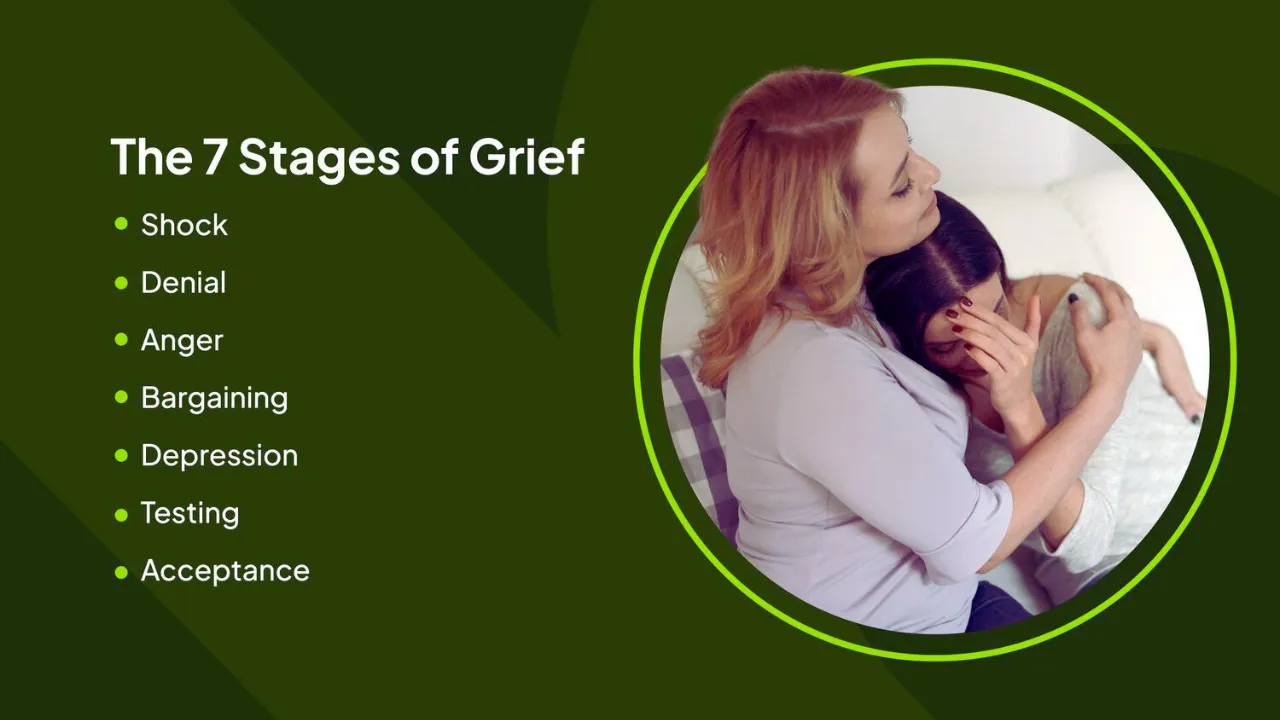Sorrow is something that almost everybody will cope with a factor, and it’s far in no way easy. Losing a loved one, ending a relationship, or even going thru a first-rate life change may make us experience lost and crushed. But understanding about the seven stages of grief, it let you apprehend what goes on inside your heart and mind. This is a map for similarly emotional roads. In this newsletter, I can run you via the stairs, signs and symptoms that you could be aware, and the simple approaches to manage when grief is barely hit.
Table of Contents
ToggleThe Seven Stages of Grief: What They Mean
Sorrow isn’t always only a feeling – it is a combination of many feelings that come and pass into the waves. Experts talk approximately the seven ranges of grief to assist provide an explanation for this rollercaster of emotions. Keep in mind, you can’t experience each degree, or you could leap between them, and it’s miles absolutely ordinary.
| Stage Number | Stage Name | What It Feels Like |
| 1 | Shock and Denial | Feeling numb, like it’s not real |
| 2 | Pain and Guilt | Deep sadness and maybe blaming yourself |
| 3 | Anger | Frustration or feeling mad |
| 4 | Bargaining | “If only…” thoughts, and trying to fix things |
| 5 | Depression | Heavy sadness and wanting to pull away |
| 6 | The Upward Turn | Slowly feeling better, a little hope |
| 7 | Acceptance | Finding peace and learning to live with loss |
Signs You Might Be Experiencing These Stages

Sometimes it’s hard to put a name to what you’re feeling. Here are some signs to help you figure out which stage you might be going through:
- Shock and Denial: You might feel numb or like the loss isn’t real. It’s your brain’s way of protecting you at first.
- Pain and Guilt: You could find yourself replaying moments or wishing things were different, carrying a heavy heart.
- Anger: Maybe you’re irritable or snapping at people, even when you don’t want to be. That frustration is natural.
- Bargaining: You catch yourself thinking, “If only I had done this…” or making deals in your head to change the past.
- Depression: Feeling tired all the time, losing interest in things, or wanting to be alone are common signs here.
- The Upward Turn: You notice you’re sleeping better or smiling more, even if just a little. Things feel a bit lighter.
- Acceptance: You might start feeling like you can move forward, even if the loss will always be part of your life.
Common Emotional & Physical Signs in Each Stage

| Stage | Emotional Signs | Physical Signs | Tips to Cope |
| Shock and Denial | Numbness, disbelief | Confusion, tiredness | Give yourself time, breathe |
| Pain and Guilt | Sadness, regret | Chest tightness, insomnia | Talk to someone, journal |
| Anger | Irritability, frustration | Headaches, tension | Exercise, write it out |
| Bargaining | Anxiety, restlessness | Loss of appetite, fatigue | Practice mindfulness |
| Depression | Hopelessness, withdrawal | Low energy, sleep issues | Seek support, small daily goals |
| The Upward Turn | Relief, better mood | Improved sleep/appetite | Stay connected, self-care |
| Acceptance | Peace, readiness to move on | Balanced energy | Engage in activities you enjoy |
How to Cope Through the Seven Stages of Grief

- Grief can experience like a storm internal, but it is a weather techniques. Here are a few realistic ideas that may help:
- Feel your feelings: Do not near your feelings. Cry, scream, write – something you have to do to get it out.
- Talk: Find someone who listens without selections. Sometimes, simply sharing your story helps lighten the weight.
- Take care of your self: Eat nicely, relax something, and circulate your body lightly. Your grief may additionally give up.
- Express yourself creatively: draw poems, paint, sing or write. Creativity may be a secure area for your feelings.
- Set small desires: Even small each day duties can provide you with a feel of success whilst the whole thing appears heavy.
- Avoid large choices: If you could, seize modifications inside the foremost existence until your brain will become clear.
- Practice Mindfulness: Exercise and meditation of respiratory can maintain you at the ground for the time being.
A Real Story: How Grief Played Out for Jamie
What are the seven stages of grief. Jamie lost his father suddenly. First, the entirety seemed unfaithful – she become in surprise and just went via the movements. Then the guilt came, questioning whether he had known as him enough or there was more. Follow anger, every so often targeted on itself, every so often on the unfairness of all. Jamie determined that during this time Jernling helped lots. Over time, she slipped into sorrow, averted pals and her normal pursuits.
Gradually, with the guide of the own family and a counselor, Jamie started to experience a bit higher. He began working voluntarily in a nearby donation in honor of his father, and this gave him a experience of reason. Eventually, Jamie reached the region of popularity – she nonetheless overlooked her father, however she ought to smile and look ahead once more.What are the seven stages of grief.
Grief Myths vs. Facts
| Myth | Reality |
| Grief ends after a certain time | Grief is personal and ongoing |
| You must feel all stages | Not everyone feels every stage |
| Being strong means no tears | Expressing emotions is healthy |
| Moving on means forgetting | Acceptance is learning to live with loss |
| Grief happens only after death | Loss can be many things, not just death |
Supporting Someone Who’s Grieving

What are the seven stages of grief. Sorrow is tough, however you do now not should face it by myself. If you or a person you love, you are suffering, attain till date. Whether he is talking to a friend, becoming a member of a help institution, or demanding expert steering, taking the first step can bring recovery. Remember, every level of sorrow is a part of your unique adventure – as you flow forward, be mild to yourself.
If someone you care about is grieving, your support matters a lot. Here’s what you can do:
- Listen to greater than you communicate: Sometimes, they just need to pay attention.
- Help with normal items: Running or cooking can be a wonderful alleviation.
- Location: Do not rush them or inform them a way to feel.
- Be patient: Sorrow isn’t always a race – it is able to take a long term.
- Encourage assist: If they get caught, suggest talking to a professional.
Wrapping Up
What are the seven stages of grief are emotional methods that help us in the technique of harm in our time and manner. From surprise and refusal to reputation, grief is complex and deep personal. Recognizing these steps and knowing the way to cope can make hard days a touch less complicated. Healing does not imply forgetting – it means dwelling with loss and locating hope once more.
FAQs
How long do seven levels of grief ultimate?
There isn’t any scheduled timeline. Everyone’s adventure of sorrow is distinctive. Some pass fast, others take months or years. It is critical to permit your self to mourn at your velocity.
Can I depart a few tiers of sorrow?
Grief does now not comply with a strict order. You can’t feel every step, or you can leap from side to side between them.
What if I am trapped in a phase of grief?
Feeling stuck, specifically in unhappiness or denial, is common. Talking to a counselor or dependable pal permit you to move forward.
How can I help a unhappy friend?
Listen patiently, offer realistic assist, and do now not hurry your emotions. Sometimes being there, it makes the whole distinction.
Is it normal to experience angry in the course of sorrow?
Yes, anger is a natural part of mourning. It can come from feeling helpless or disappointed. It is crucial to find a healthful approaches to explicit it.
Can sorrow motive physical signs and symptoms?
Yes, sorrow regularly influences the frame. You can also feel worn-out, headache, or changes in urge for food. Taking care of your body facilitates your treatment.
When should I seek professional help for grief?
If grief overwhelms your daily life or lasts a very long time, professional help like therapy can provide valuable support.





